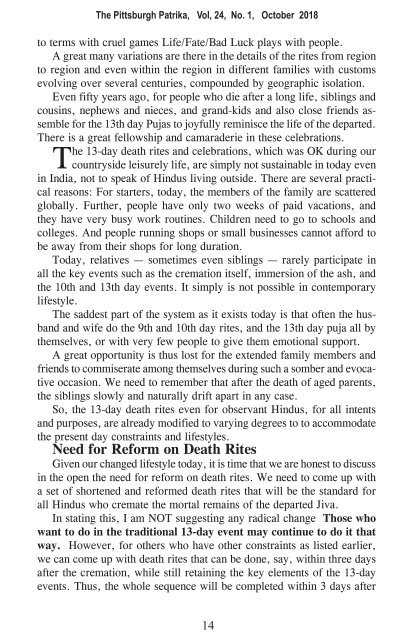Pittsburgh Patrika October 2018 issue
You also want an ePaper? Increase the reach of your titles
YUMPU automatically turns print PDFs into web optimized ePapers that Google loves.
The <strong>Pittsburgh</strong> <strong>Patrika</strong>, Vol, 24, No. 1, <strong>October</strong> <strong>2018</strong><br />
to terms with cruel games Life/Fate/Bad Luck plays with people.<br />
A great many variations are there in the details of the rites from region<br />
to region and even within the region in different families with customs<br />
evolving over several centuries, compounded by geographic isolation.<br />
Even fifty years ago, for people who die after a long life, siblings and<br />
cousins, nephews and nieces, and grand-kids and also close friends assemble<br />
for the 13th day Pujas to joyfully reminisce the life of the departed.<br />
There is a great fellowship and camaraderie in these celebrations.<br />
13-day death rites and celebrations, which was OK during our<br />
The countryside leisurely life, are simply not sustainable in today even<br />
in India, not to speak of Hindus living outside. There are several practical<br />
reasons: For starters, today, the members of the family are scattered<br />
globally. Further, people have only two weeks of paid vacations, and<br />
they have very busy work routines. Children need to go to schools and<br />
colleges. And people running shops or small businesses cannot afford to<br />
be away from their shops for long duration.<br />
Today, relatives — sometimes even siblings — rarely participate in<br />
all the key events such as the cremation itself, immersion of the ash, and<br />
the 10th and 13th day events. It simply is not possible in contemporary<br />
lifestyle.<br />
The saddest part of the system as it exists today is that often the husband<br />
and wife do the 9th and 10th day rites, and the 13th day puja all by<br />
themselves, or with very few people to give them emotional support.<br />
A great opportunity is thus lost for the extended family members and<br />
friends to commiserate among themselves during such a somber and evocative<br />
occasion. We need to remember that after the death of aged parents,<br />
the siblings slowly and naturally drift apart in any case.<br />
So, the 13-day death rites even for observant Hindus, for all intents<br />
and purposes, are already modified to varying degrees to to accommodate<br />
the present day constraints and lifestyles.<br />
Need for Reform on Death Rites<br />
Given our changed lifestyle today, it is time that we are honest to discuss<br />
in the open the need for reform on death rites. We need to come up with<br />
a set of shortened and reformed death rites that will be the standard for<br />
all Hindus who cremate the mortal remains of the departed Jiva.<br />
In stating this, I am NOT suggesting any radical change Those who<br />
want to do in the traditional 13-day event may continue to do it that<br />
way. However, for others who have other constraints as listed earlier,<br />
we can come up with death rites that can be done, say, within three days<br />
after the cremation, while still retaining the key elements of the 13-day<br />
events. Thus, the whole sequence will be completed within 3 days after<br />
14


















